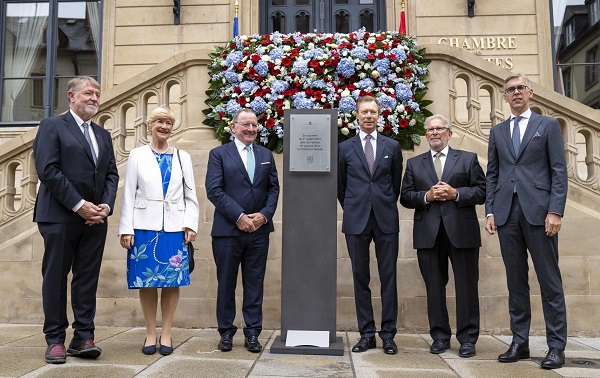 (L-R) MP Charles Margue; MP Simone Beissel; Fernand Etgen, President of the Chamber of Deputies; Grand Duke Henri; Mars Di Bartolomeo; Mars Di Bartolomeo, President of the committee for constitutional revision; MP Léon Gloden;
Credit: Chamber of Deputies
(L-R) MP Charles Margue; MP Simone Beissel; Fernand Etgen, President of the Chamber of Deputies; Grand Duke Henri; Mars Di Bartolomeo; Mars Di Bartolomeo, President of the committee for constitutional revision; MP Léon Gloden;
Credit: Chamber of Deputies
The new Constitution of Luxembourg came into force on Saturday 1 July 2023; this revised text is the culmination of almost two decades of debates and review.
On Saturday, a ceremony took place on the forecourt of the Chamber of Deputies (Luxembourg's parliament) in Luxembourg-Ville, in the presence of about 130 guests. Among them was the Grand Duke of Luxembourg, who unveiled a plaque dedicated to the entry into force of this revised Constitution.
Other guests included representatives of various state, government and justice institutions, MPs ambassadors and citizens who contributed to the development of the new text by formulating proposals.
"It is a historic day. 1 July 2023 will go down in history because it marks the entry into force of the most important law in our country […] in its revised form," stated Fernand Etgen, President of the Chamber of Deputies (Luxembourg's parliament), at the start of the ceremony. According to President Etgen, the Grand Duchy now boasts "one of the most modern constitutions in Europe".
Mars Di Bartolomeo, President of the committee for constitutional revision, commented on the symbolism of the location of this ceremony: "We are celebrating our revised Constitution in the open air, in front of the Chamber of Deputies, a square which connects all the fundamental institutions with each other." He thanked everyone who contributed to the development of the new text over the years. He also recalled the objective of the revision: to adapt the fundamental law to the functioning of a modern democracy.
Moreover, Mars Di Bartolomeo responded to some of the criticism that accompanied the revision process, for example regarding citizen participation: "Even though the announced referendum never took place, citizen forums like the 'Är Virschléi' initiative and public hearings influenced the text."
The revised text also provides for a new instrument allowing 125 voters or more to submit a legislative initiative to the Chamber of Deputies, via the newly launched website www.propositions.lu; if it receives support from at least 12,500 voters, the Chamber will hold a public session to decide on these so-called reasoned proposals for the purpose of legislating.
Additional changes to the Constitution of Luxembourg include:
- simplified access for MPs to the right of inquiry: an inquiry committee can now be set up at the request of at least one-third of MPs (20 out of 60) instead of more than half of MPs (31) previously;
- the creation of the new National Council of Justice (Conseil National de la Justice). Its mission is to ensure the proper functioning of justice while respecting its independence;
- the Luxembourgish language, the flag, the coat of arms and the national anthem have been introduced into the Constitution;
- the text specifies that the Grand Duchy of Luxembourg participates in European integration;
- the right to housing, the right to work, the safeguarding of biodiversity, the protection of cultural heritage and the recognition of animals as living beings endowed with sensitivity are among the new objectives with constitutional value;
- the interest of the child, the right to found a family and the protection of personal data have also been introduced in the text;
- the powers of the Chamber of Deputies have been strengthened, for example through the introduction of a motion of confidence and a motion of censure with regard to the Luxembourg Government;
- the accession to the office of Grand Duke, abdication and regency are now detailed in the Constitution. All references to the Nassau Family Covenant have been removed.
The revised Constitution of Luxembourg is available in the country's three official (administrative) languages (Luxembourgish, French and German) and can be downloaded as a PDF here.








